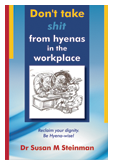
Bullying in South Africa
77,8% of South Africans say that experienced some form of victimisation during their careers. This was determined in an internet survey in 2000. However, bullying is persistent, prolonged and happens over a period of time, it is humiliating, damaging, vindictive and cruel and can be overt or covert with a definite impact on the well-being if the victim. Sometimes people confuse conflict and bullying and this figure may not be reliable. However, new research indicates that workplace bullying is over 20% in the health sector. There is also a difference between the public and the private sector.
The most frequently reported incidents of workplace bullying is:
- Talking about someone behind his/her back
- Interrupting others while they are speaking or working
- Flaunting status or authority; acting in a condescending manner
- Belittling someone's opinion
- Mood swings
- Failing to return phone calls or respond to memos
- Giving others the silent treatment
- Insults, yelling, swearing, name-calling, threats, shouting, rude gestures and aggressive posturing
- Staring, dirty looks, looking "over you" or avoiding eye contact or other negative eye contact
- Intentionally damning with faint praise
- Undermining actions by a co-worker
- Spreading stories and half-truths
- Humiliating an employee in the presence of others
- Ridicule, teasing and sarcasm
- Overloading a person with work as a form of punishment
- Refusing a person rights or privileges
- False accusations
- "Stealing" subordinates' work
- Deceiving or setting someone up.
- Harassment, including sexual and racial
- Abuse
- Intimidation
- Leaving offensive messages
- Interfering with work tools and equipment
What are the causes of workplace bullying?
- The psychological make-up of the perpetrator. Not all perpetrators are sociopath. In fact, only 2-4% of these perpetrators is sociopath, but because of their personality traits they influence a much larger percentage of people. Most other perpetrators present with equally negative and harmful survival behaviour.
- Economic conditions, the social status of the victim
- If corporate culture permits and rewards hostile behaviour, is part of leadership and managerial practice. Or sarcasm, teasing and ridicule are allowed. The absence of a strong policies and intervention strategies. Even when the corporate culture is co-operative, workplace hostilities go "underground", are very sophisticated and it takes a watchful eye to detect it.
- Managerial factors like deficiency in work design, inappropriate and inadequate communication, low moral standards, lack of stimulating and challenging tasks, poor supervisors, frustrations and conflicts relating to rights, obligations, privileges, position, poor interpersonal relationships and the need for a suitable scapegoat.
- The encouragement of management styles typical of bullying in popular literature.
- Changes like restructuring, looming retrenchments and mergers can spark off workplace wars in a normally peaceful environment.
According to the International Labour Organisation in Geneva there is an increased awareness of workplace bullying in industrialised countries and it is therefore better reported. In the UK, where there is great awareness of bullying, the figure is 53% having been victims of hostilities and 78% reported having witnessed bullying in the workplace.
Workplace bullying and stress have an impact on the bottom line. Research world-wide indicate that 1.5 - 3.5% of a country's GDP is lost because of stress and bullying in the workplace. Developing countries cannot afford such a loss. Add to this the impact of HIV/AIDS in the workplace, our programmes and interventions should aimed at PREVENTING workplace violence and bullying by putting policies, strategies and programmes in place.
(Click on image below to go to our store)

Read more...
Victim Support
Go to the 'For Victims' section
on our website for tools
and information on bullying.

Employee Wellness Program
If you are an employer, you
can contact us to arrange
a employee wellness program
for your organisation.

Receive our monthly Newsletter
Fill in your e-mail below and receive
updated information and
interesting news about workplace
communication, career
inspiration, workshops, conferences,
website updates, programmes and training
and the Foundation's work.
Subscribe to the WorkcomNews